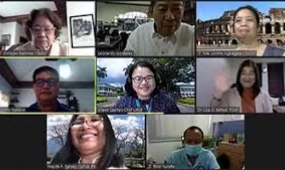By Zenaida M. Huelgas, Kathlyn Cheryl A. Laguador, and Annette M. Tobias, and Mia Barbara D.V. Aranas, DOST-PCAARRD S&T Media Services
A total of 11 biotechnology experts participated in the virtual roundtable discussion cum crop biotechnology policy (RTD-CBP) workshop organized by the Philippine Council for Agriculture, Aquatic and Natural Resources Research and Development of the Department of Science and Technology (DOST-PCAARRD).
The RTD was organized by the Council’s biotechnology policy review team.
The experts included National Scientist Emil Q. Javier; Academician William G. Padolina; National Scientist Dr. Dolores A. Ramirez; Dr. Violeta N. Villegas, Consultant at the Institute of Plant Breeding (IPB), University of the Philippines Los Banos (UPLB); Dr. Marilyn B. Brown, Director of National Institutes of Molecular Biology and Biotechnology; Dr. Hayde C.F. Galvez, Assistant Professor and Head of Genetics Lab, UPLB-IPB; Dr. Leonardo A. Gonzales, President of Society Towards Reinforcing Inherent Viability for Enrichment (SIKAP/STRIVE) Inc.; Academician Agnes C. Rola; Assistant Scientist Ma. Lorelie U. Agbagala of the DOST-National Committee on Biosafety of the Philippines (NCBP); Country Coordinator Carlo G. Custodio Jr., Programs for Biosafety Systems-Philippines; and Dr. Aileen V. Lapitan, Assistant Professor at UPLB.
The RTD aimed to elicit feedback, opinions, and recommendations from the top biotechnology experts on the following issues: the prevalence of counterfeit genetically-modified (GM) seeds; defining a product-based regulation with the advent of non-transgenic crops developed through New Breeding Techniques (NBTs), and the implications of legislating biosafety regulation through the creation of the Biotechnology Authority of the Philippines (BioAP).
Experts agreed that the prevalence of counterfeit GM seeds mostly affects the private developers. This may also be of public concern because of the possibility of insect resistance build-up. The nature of the problem is rather complex that apparently renders legal solutions impractical.
On the other hand, the panel argued that transforming regulatory rules from process-based to product-based will enable commercialization of second generation genetically engineered or biotech crops that are free of foreign genes. The science of genome editing is evolving fast or faster than the ability of regulators to amend the rules.
Hence, establishment of a mechanism that allows flexible and periodical amendments of the regulatory guidelines to keep up with the advances in science is necessary if crop development is seen as one of the means to achieve food security. Experts also advocate non-transgenic products of genetic engineering to be equivalent to conventionally-bred crops and therefore, unregulated.
Majority of the experts recommended BioAP to be dedicated to the promotion and development of agricultural biotechnology in the country, while the NCBP should be provided with GAA funding and plantilla positions to perform the regulatory functions.
It was also felt strongly among the experts, who at some point or another were involved in research, that the government procurement system should be amended so that a different set of rules is crafted specifically for public research agencies.
Despite being held online, the RTD-CBP workshop went smoothly. Restrictions in face-to-face meetings have become necessary to maintain the safety of individuals in the course of the current pandemic. The virtual RTD proved to be productive despite the lack of the participants’ physical presence. Recommendations and insights drawn from this activity would greatly contribute to the findings of this study.
The RTD-CBP workshop is integral to the project, “A Review of Policies on Crop Biotechnology: Impacts on Food Security and Agriculture Development in the Climate Change Era,” implemented by DOST-PCAARRD and funded by the Department of Agriculture’s Philippine Council for Agriculture and Fisheries (DA-PCAF).
The study aims to assess the contributions of the Philippines’ crop biotechnology policies to the development of the food industry, specifically in the growth of the agriculture sector and the country’s attainment of food security.
Photo:
The RTD cum workshop held virtually on September 8, 2020 via Zoom shows (from top left to right) Dr. Dolores A. Ramirez, Dr. Leonardo A. Gonzales, Ms. Ma. Lorelie U. Agbagala, (middle) Dr. Johnny T. Batalon, Dr. Aileen V. Lapitan, Dr. Liza G. Battad, (Bottom) Dr. Hayde F. Galvez, and Dr. Roel Suralta. There were about 45 attendees at any given time from the various agencies of DA and units of PCAARRD.
Panelists and other attendees of the RTD-CBP Workshop. From top, left to right: Dr. Dolores A. Ramirez, Dr. Reynaldo V. Ebora, Dr. Leonardo A. Gonzales, Dr. William G. Padolina, Dr. Marilyn B. Brown, Dr. Ernesto O. Brown, Dr. Aileen V. Lapitan, Dr. Emil Q. Javier, Dr. Juanito T. Batalon, Dr. Hayde C.F. Galvez, Ms. Ma. Lorelie U. Agbagala, Dr. Liza G. Battad, Dr. Violeta N. Villegas, Dr. Agnes C. Rola, and Ms. Zenaida M. Huelgas.




